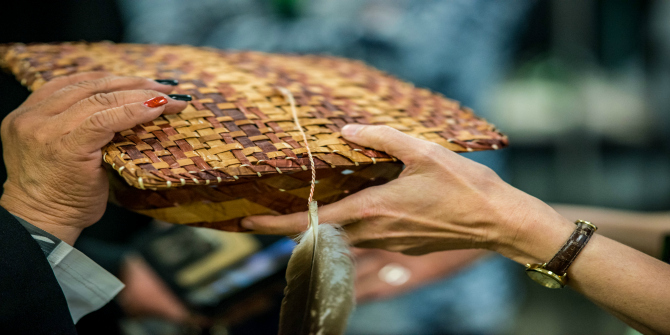 Image Credit: Indigenous Graduate Reception, February 2017, University of the Fraser Valley (University of the Fraser Valley CC BY 2.0)
Image Credit: Indigenous Graduate Reception, February 2017, University of the Fraser Valley (University of the Fraser Valley CC BY 2.0)
In this reading list, Helen Kara recommends 8 books for those looking to incorporate Indigenous methodologies within their own research and to better understand Indigenous research methods on their own terms. This reading list was originally published on Helen Kara’s own blog.
Recently I wrote about challenging the dominance of English in writing for research and academia. That theme is also relevant to this reading list, though here it’s more about challenging Euro-Western epistemologies and methods than the English language itself. Over the last year I have built a personal library of books about or relevant to my investigation of Indigenous research methods and ethics. The point of this, for me, is to bring these methods into my scholarship, alongside creative and conventional methods, as appropriate. The point is not to become an ‘expert’ on Indigenous research: for a white British person, that is not – should not be – an option. At the start of this work, I worried about being extractive, but I found comfort in the words of Margaret Kovach, an Indigenous researcher from Saskatchewan in Canada, who encourages non-Indigenous scholars to help make space for Indigenous methodologies and assess their value on their own terms. This is what I am trying to do.
For those who are new to this topic, ‘Indigenous’ denotes the native peoples of colonised lands, such as Aboriginal Australians or Inuit Alaskans, while ‘indigenous’ denotes the native peoples of non-colonised lands. So I am an indigenous Brit who will never be an Indigenous researcher. Some people described as Indigenous are unhappy with the term because they feel that it makes them seem like one homogeneous group, whereas in fact there is tremendous diversity. For example, there are hundreds of tribal and language groupings in Australia alone. However, as it is the term most commonly used in the literature, I’m sticking with it for now.
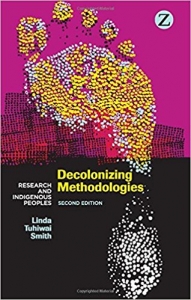 Decolonizing Methodologies: Research and Indigenous Peoples. Linda Tuhiwai Smith. Zed Books. 2012.
Decolonizing Methodologies: Research and Indigenous Peoples. Linda Tuhiwai Smith. Zed Books. 2012.
The first book is the foundational Decolonizing Methodologies by Linda Tuhiwai Smith, a Maori researcher from New Zealand. I bought the first edition of this soon after it came out in 1999, the year I began my MSc in Social Research Methods. The second edition came out in 2012. This book shows how research was used as a tool of imperialism to help subjugate colonised peoples through, among other things, complete disregard for Indigenous knowledges and Indigenous peoples’ own research methods. It highlights the value of these knowledges and methods, and calls for research to be linked explicitly with social justice.
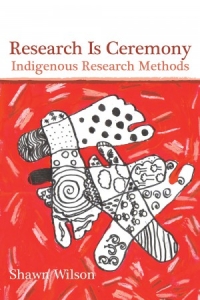 Research is Ceremony: Indigenous Research Methods. Shawn Wilson. Fernwood Publishing Co. 2008.
Research is Ceremony: Indigenous Research Methods. Shawn Wilson. Fernwood Publishing Co. 2008.
Shawn Wilson is an Opaskwayak Cree researcher from Canada who has also lived and worked with Indigenous peoples in Alaska and Australia, as well as spending time with Indigenous peoples in New Zealand, Morocco and elsewhere. Research is Ceremony is based on his doctoral research and describes a paradigm shared by Indigenous researchers in Canada and Australia. It’s not easy to get hold of: I tracked down a Canadian bookseller who seems to have bought up the last available copies, and I fear it may be going out of print, which would be a great shame as it is readable and insightful.
Margaret Kovach is a Plains Cree and Salteaux researcher from Canada, whose Indigenous Methodologies came out in 2009. Her book covers epistemologies, methods and ethics. It is a work of considerable scholarship that is also accessible and full of wisdom.
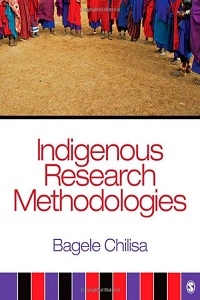 Indigenous Research Methodologies. Bagele Chilisa. SAGE. 2011.
Indigenous Research Methodologies. Bagele Chilisa. SAGE. 2011.
Bagele Chilisa is a Professor at the University of Botswana. Indigenous Research Methodologies gives an uncompromising and international account of some of the theories, epistemologies, ontologies and methods used by Indigenous researchers. While no book on this subject could be completely comprehensive, Chilisa makes a good job of showing the diversity, as well as some of the commonalities, of Indigenous methodology. Read the review on LSE Review of Books.
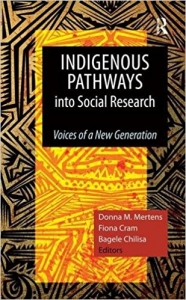 Indigenous Pathways into Social Research: Voices of a New Generation. Donna Mertens, Fiona Cram and Bagele Chilisa. Left Coast Press. 2013.
Indigenous Pathways into Social Research: Voices of a New Generation. Donna Mertens, Fiona Cram and Bagele Chilisa. Left Coast Press. 2013.
Donna Mertens, Fiona Cram and Bagele Chilisa have edited a collection called Indigenous Pathways into Social Research. They have contributions from Indigenous researchers from all around the world: Vanuatu, Mexico, Cameroon, Hawai’i, Alaska, Papua New Guinea and many other countries. These are fascinating accounts, highlighting personal, political and ethical challenges and how they have been overcome. The contributors also say a lot about Indigenous methodologies around the world.
In 2013 Maggie Walter, a trawlwoolway researcher from Tasmania, and Chris Andersen, a Métis researcher from Canada, brought out Indigenous Statistics. The book demonstrates the pervasiveness of Euro-Western thought in the construction of statistical research, using national censuses for illustration. It offers a framework for Indigenous quantitative research, nayri kati or ‘good numbers’, placing an Indigenous standpoint at the centre. There is a short video online of Maggie Walter talking about Indigenous quantitative research.
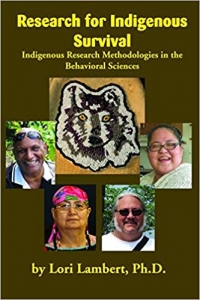 Research for Indigenous Survival: Indigenous Research Methodologies in the Behavioral Sciences. Lori Lambert. Salish Kootenai College Press. 2014.
Research for Indigenous Survival: Indigenous Research Methodologies in the Behavioral Sciences. Lori Lambert. Salish Kootenai College Press. 2014.
Lori Lambert is a Mi’kmaq researcher from north-eastern Canada who has also worked with Indigenous peoples from Montana, US, northern Manitoba, Canada and Queensland, Australia. Research for Indigenous Survival was published in 2014. To the best of my knowledge, this is the first book to position Indigenous methods within a Euro-Western disciplinary category. Like other Canadian writers, such as Wilson and Kovach (above), Lambert includes the voices of people she has worked with alongside her own in her narrative.
Another essential text, though not specifically about research methods, is Southern Theory by Australian academic Raewyn Connell. This book is subtitled ‘The Global Dynamics of Knowledge in Social Science’ and in my view is essential reading for anyone engaging with social theory. During my MSc, I was taught social theory as the preserve of dead white men, and I am sure this is still being taught in many Euro-Western universities today. Connell’s book gives the lie to this approach.
This list is not exhaustive; it is just my personal library. One limitation is that I can’t afford expensive books. While I was writing this blog post, I had a message from my friend and colleague Roxanne Persaud, alerting me to Susan Strega and Leslie Brown’s edited collection Research as Resistance: Revisiting Critical, Indigenous, and Anti-Oppressive Practices (2nd edn, 2015). I would love to read this book, but even the paperback is over £60, which puts it out of my reach.
These books are not comfortable reads for Euro-Western scholars, but they are hugely important. We need to know how research has been and still is misused by Euro-Western cultures in order to learn how to use it better. Indigenous scholars are extraordinarily generous in their assessment of the potential value of Euro-Western methodologies, even those methodologies that have been instrumental in stealing their lands and their cultures and traumatising generations of their peoples. Yet most Euro-Western researchers either ignore Indigenous research entirely or conclude that Indigenous peoples must have picked up a few tricks from the colonisers. I’m not sure which is worse. Indigenous research methods pre-date Euro-Western research methods by tens of thousands of years, and there is a great deal that Euro-Western researchers can learn from these approaches.
Dr Helen Kara has been an independent researcher since 1999, focusing on social care and health, partnership working and the third sector. She teaches and writes on research methods. Her most recent full-length book is Creative Research Methods in the Social Sciences: A Practical Guide (Policy, 2015), reviewed on LSE Review of Books, and she is also the author of the PhD Knowledge series of short e-books for doctoral students. Helen is a Visiting Fellow at the National Centre for Research Methods, and a Fellow of the Academy of Social Sciences. Read more by Helen Kara.
Note: This review gives the views of the author, and not the position of the LSE Review of Books blog, or of the London School of Economics.


 Indigenous Methodologies: Characteristics, Conversations and Contexts. Margaret Elizabeth Kovach. University of Toronto Press. 2009.
Indigenous Methodologies: Characteristics, Conversations and Contexts. Margaret Elizabeth Kovach. University of Toronto Press. 2009. 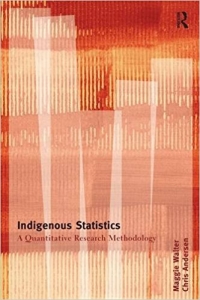 Indigenous Statistics: A Quantitative Research Methodology. Maggie Walter and Chris Andersen. Left Coast Press. 2013.
Indigenous Statistics: A Quantitative Research Methodology. Maggie Walter and Chris Andersen. Left Coast Press. 2013. 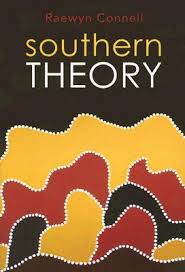 Southern Theory: Social Science and the Global Dynamics of Knowledge. Raewyn Connell. Polity Press. 2007.
Southern Theory: Social Science and the Global Dynamics of Knowledge. Raewyn Connell. Polity Press. 2007. 
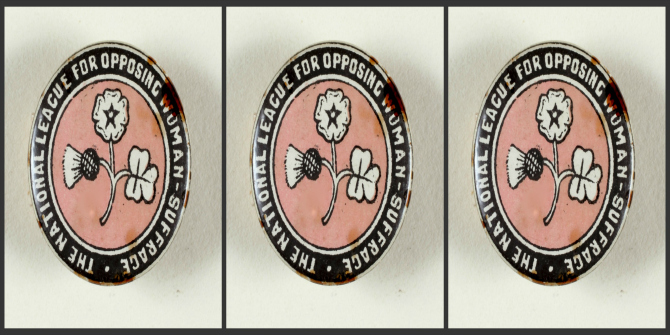
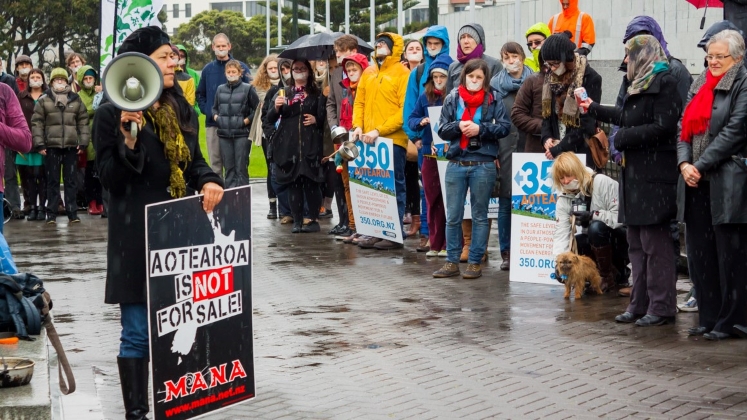



2 Comments